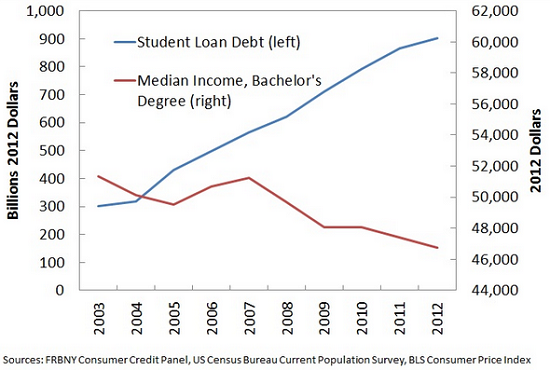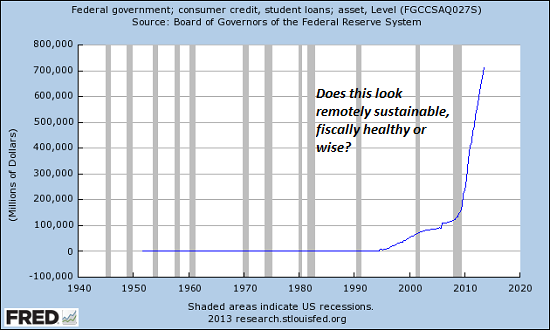I have long identified diminishing returns as a key dynamic in the current unraveling of the Status Quo. Why is this so? We can summarize diminishing returns as dumping more money, capital, energy and effort into a system just to keep the output from falling to zero.
But as the costs of keeping the system from imploding rise, they soon consume all the oxygen in the system, and the system implodes anyway.
The Fatal Disease of the Status Quo: Diminishing Returns (May 1, 2013)
Our Era’s Definitive Dynamic: Diminishing Returns (November 11, 2013)
Sickcare, higher education and insanely expensive weapons systems are all examples of this dynamic. The higher education cartel has raised gargantuan sums to fund its poor quality product by turning students into debt-serfs via student loans.


We must add a second definitive dynamic: protecting vested interests. There are many ways of describing powerful constituencies with an enormous stake in maintaining the Status Quo--vested or entrenched interests, for example--but the key characteristic is the enormous political pain that these groups can inflict on self-serving politicos.
Once confronted with an aroused vested interest--public union, cartel, corporatocracy, Power Elite, etc.--politicos cave in and do what is politically expedient: avoid any real reform and simply shovel more money into the gaping maw of diminishing returns.
A good example is soaring higher education costs and the decline of actual learning and the real-world value of a college diploma. The long-term study Academically Adrift: Limited Learning on College Campuses concluded that "American higher education is characterized by limited or no learning for a large proportion of students."
But rather than enable (or even insist) on real reforms that dramatically lowered costs and improved results, the political Status Quo responds to the higher education cartel's screams for more money by extending more student credit and taxpayer-paid aid to the cartel.
(I address all these issues in my book The Nearly Free University and The Emerging Economy: The Revolution in Higher Education.)
Once politicos respond to the cries for more money and protection from diminishing returns from vested interests, the real problem festers, unsolved and addressed, while the politically expedient "solution" drains resources away from real reform and exacerbates the underlying problem.
You see the end-game this cycle of vested interests and political expedience creates: as the real problems go unaddressed, they further diminish returns, which triggers even more frantic calls by vested interests for more funding and more protection from the creative destruction of diminishing returns.
Meanwhile, the opportunity cost of supporting diminishing-return vested interests continually increases as scarce resources are squandered on supporting entrenched interests.
Eventually the parasitic entrenched interests have consumed all the oxygen in the system and the system collapses under its own weight.
In a political system where money buys concentrated political power, decisions that affect 100% of the populace are made to benefit the 5% most powerful entrenched interests. How can wise decisions be made when all decision-making centers around placating politically dominant interests? Answer: they can't. Decisions made to protect and favor the few at the expense of the many are intrinsically unwise, as they are blind to the consequences heaped on the voiceless 95%.
Vested interests span the entire political spectrum. The "progressive" favorites, banking, higher education, public unions and sickcare, are all able to veto any reforms that threaten their share of the swag or that demand higher returns on the ever-rising sums poured into these systems.
The "conservative" favorites, banking (every politico is beholden to financial Elites), weaponry, energy, and corporate welfare, are equally able to squelch reform that threatens their share of the swag.
Combine diminishing returns with the political dominance of vested interests and you get a system incapable of reforming itself and incapable of stopping the slide off the cliff. Vested interests have no concern for the unintended consequences of their self-aggrandizement; the entire poilitical structure is based on the faith that there is always more money to feed the insatiable hunger of entrenched interests for more funding, more protection and more power.
That there might be limits that cannot be surpassed without imploding the entire rickety, corrupt system is a danger that cannot be recognized, much less discussed in the halls of power, lest the faith that unwise decisions and spending can pile up year after year and decade after decade forever be questioned.
And so the only possible "solution" left is collapse. This is the lesson of the book The Upside of Down: Catastrophe, Creativity, and the Renewal of Civilization, which illustrates that the solution has always been collapse when corrupted, self-serving vested interests gain control of the political system and the economy.
Want to give an enduringly practical graduation gift? Then give my new book Get a Job, Build a Real Career and Defy a Bewildering Economy, a mere $9.95 for the Kindle ebook edition and $17.76 for the print edition.
Join me on May 2 for the Sonoma Wine Country Conference: Investment Ideas Hidden In Plain Sight: great speakers, good cause (benefits Autism Society of America):

Get a Job, Build a Real Career and Defy a Bewildering Economy(Kindle, $9.95)(print, $20)

Are you like me? Ever since my first summer job decades ago, I've been chasing financial security. Not win-the-lottery, Bill Gates riches (although it would be nice!), but simply a feeling of financial control. I want my financial worries to if not disappear at least be manageable and comprehensible.
And like most of you, the way I've moved toward my goal has always hinged not just on having a job but a career.
You don't have to be a financial blogger to know that "having a job" and "having a career" do not mean the same thing today as they did when I first started swinging a hammer for a paycheck.
Even the basic concept "getting a job" has changed so radically that jobs--getting and keeping them, and the perceived lack of them--is the number one financial topic among friends, family and for that matter, complete strangers.
So I sat down and wrote this book: Get a Job, Build a Real Career and Defy a Bewildering Economy.
It details everything I've verified about employment and the economy, and lays out an action plan to get you employed.
I am proud of this book. It is the culmination of both my practical work experiences and my financial analysis, and it is a useful, practical, and clarifying read.
Test drive the first section and see for yourself. Kindle, $9.95 print, $20
"I want to thank you for creating your book Get a Job, Build a Real Career and Defy a Bewildering Economy. It is rare to find a person with a mind like yours, who can take a holistic systems view of things without being captured by specific perspectives or agendas. Your contribution to humanity is much appreciated."
Laura Y.
| Thank you, John S. ($50), for your superbly generous contribution to this site -- I am greatly honored by your steadfast support and readership. | Thank you, Steve B. ($50), for your splendidly generous contribution to this site -- I am greatly honored by your support and readership. |
